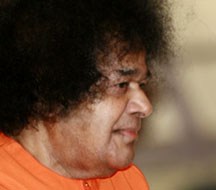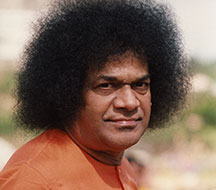
Scriptures and Puranas proclaim truth
Puttaparthi, Sai Kulwanth Hall (1996 Special Discourses )
Description
It is only when action is related to the Atma that the nature of Sathya or Truth stands revealed. Where the Atma or the Ultimate Truth is concerned, there is no room or scope for any doubt. People do not accept many things said in the scriptures because they tend to view these statements in purely physical terms and from a narrow perspective. It is a mistake to do so. It is only through proper analysis that the correct meaning of the scriptures can be grasped. It is said, for example, that Vishnu, Lakshmi and Saraswati are born of out of the Lotus. It means that everything Divine is associated with the Lotus of the Heart. That said, people do have good and bad thoughts. Such thoughts do not belong to the realm of the Heart but to the mind. Thus, what you think you become. Just because you are unable to appreciate the symbolism and grasp the inner meaning, you cannot say that the scriptures are wrong. Be patient, take time and try to understand the correct meaning. Do not be impatient and allow doubts to agitate your mind. Be calm and steadfast, and do not doubt the Puranas or scriptural mythology. Who has written these Puranas? They are not written by some ordinary people. They have been written by none other than great sages like Valmiki and Vyasa, who were the very embodiments of wisdom. Today, there are no scholars or poets comparable to them. There is absolutely no room for any untruth in the Puranas. Although one might dismiss the Puranas based on one’s feelings and limited perception, they do not have any element of untruth. The Puranas do not lead one to the wrong path. On the contrary, the show the path to idealism and Truth, are nothing short of text books of Wisdom. It is important to lead an ideal life and to do so, one must first reduce talking. Be disciplined and obey God’s command. Under no circumstances must discipline be compromised. Tarkad’s son was just sixteen years old. Yet, not sure that his father would offer regular worship, the boy made his father promise that he would do so. In the end, it was the boy’s purity of thought that made his father seek an apology. No doubt there was an age gap between the father and the son. However, the same Atma was present in both of them. Truth is one and age becomes irrelevant where Truth is concerned. Truth is always one and there is no such thing as different truths for different castes such as Brahmins and Sudras, who represent the two ends of the caste spectrum. Truth is one, not two. The Vedic declaration “Ekameva adviteeyam Brahma,” means that God is only one. The ancient tradition of India is rich in scriptural declarations that proclaim Truth. The wisdom and cultural tradition of India have diffused widely into the world.
Topics
-Upanishad
-

Reading scriptures cannot give you wisdom
00:01:16Sastras....Sastras...Sastras.. What are these Sastras? They may impart some general knowledge. It is only worldly knowledge but not any Divine knowledge or spiritual knowledge. To get Divine wisdom, these scriptures may be of no avail. They may, at best, impact your Mind! One boy kept Ramayana in front of him and started turning the pages in their order. There was a Scholar, next to him who was also perusing Ramayana in all earnestness. Boy is ignorant of the content as against the Scholar who is reading the content. Both of them are turning the pages, though! Boy is looking at the pictures and the scholar is reading the content. This is the basic difference.
Topics
- Analogies
- Atma
- Attachment
- Balvikas
- Bhaja Govindam
- Bhajans
- Body
- Character
- Company
- Compassion
- Culture
- Day to day
- Desire
- Devotees
- Devotion
- Dharma
- Discipline
- Discrimination
- Doctors
- Education
- Faith
- Festivals
- Forbearance
- Gayathri
- God
- Gratitude
- Guru
- Health and healthcare
- HIS Life
- Human values
- India
- Karma
- Love
- Mahabharata
- Man
- Meditation
- Mind
- Music
- Musicians
- Namasmarana
- Nature
- Parents
- Philosophical concepts
- Pleasure and Pain
- Practice
- Ramayana
- Religion
- Sacrifice
- Sadhana
- Sai Organization
- Saints
- Sathya
- Science
- Senses
- Service
- Sevadal
- Shanthi
- Shirdi Baba
- Society
- Spirituality
- Students
- Thoughts
- Time
- Unity
- Vedas
- Vices
- Yoga
- Youth
